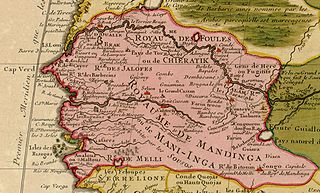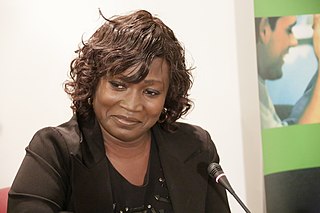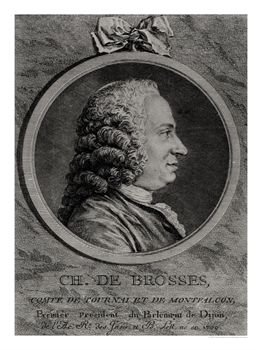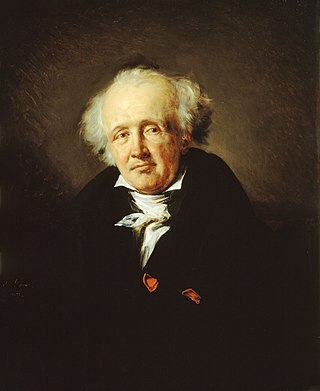Related Research Articles

The history of Senegal is commonly divided into a number of periods, encompassing the prehistoric era, the precolonial period, colonialism, and the contemporary era.
The Lebu are a subgroup of Wolof in Senegal, West Africa, living on the peninsula of Cap-Vert, site of Dakar. The Lebu are primarily a fishing community, but they have a substantial business in construction supplies and real estate. They speak Lebu Wolof, which is closely related to Wolof proper but is not intelligible with it.

Sokhna Benga (Mbengue) is a Senegalese novelist and poet. She writes in French.

Charles de Brosses, comte de Tournay, baron de Montfalcon, seigneur de Vezins et de Prevessin, was a French scholar of the 18th century.
Djibril Tamsir Niane was a Guinean historian, playwright, and short story writer.
Lamine Diakhate was an author, poet and literary critic of the négritude school and has served his country as a politician and diplomat.
Michel, chevalier de Cubières was an 18th-century French writer, known under the pen-names of Palmézaux and Dorat-Cubières, taking the latter name as he had Claude Joseph Dorat as his master.

Marc-Antoine Jullien, called Jullien fils was a French revolutionary and man of letters.

Women in Senegal have a traditional social status as shaped by local custom and religion. According to 2005 survey, the female genital mutilation prevalence rate stands at 28% of all women in Senegal aged between 15 and 49.
Maad a Signig Kumba Ndoffene Famak Joof was the King of Sine in modern-day Senegal. Maad a Sinig means king of Sine. He ruled from 1853 until his death on 23 August 1871. He was the son of Maad Souka Ndela Joof and Lingeer Gnilane Jogoy Joof. His father – Maad Souka Ndela came from The Royal House of Semou Njekeh Joof founded by Maad Semou Njekeh Joof in the early 18th century, which was the third and last Royal House of Joof family of Sine and Saloum. His paternal family ruled three Kingdoms : Sine, Kingdom of Saloum and previously the Kingdom of Baol. They descended from Maad Ndaah Njemeh Joof the 13th century King of Lâ (Laah) in Baol.

Joof or Diouf is a surname that is typically Serer. This surname is also spelt Juuf or Juf.

Barthélemy Mercier de Saint-Léger was a French abbot and librarian.
Serer maternal clans or Serer matriclans are the maternal clans of the Serer people of Senegal, the Gambia and Mauritania. The Serer are both patrilineal and matrilineal. Inheritance depends on the nature of the asset being inherited – i.e. whether it is a maternal asset which requires maternal inheritance or paternal asset requiring paternal inheritance (kucarla). The Serer woman play a vital role in royal and religious affairs. In pre-colonial times until the abolition of their monarchies, a Serer king would be required to crown his mother, maternal aunt or sister as Lingeer (queen) after his own coronation. This re-affirms the maternal lineage to which they both belong (Tim). The Lingeer was very powerful and had her own army and palace. She was the queen of all women and presided over female cases. From a religious perspective, the Serer woman plays a vital role in Serer religion. As members of the Serer priestly class, they are among the guardians of Serer religion, sciences, ethics and culture. There are several Serer matriclans; not all of them are listed here. Alliance between matriclans in order to achieve a common goal was, and still is very common. The same clan can be called a different name depending on which part of Serer country one finds oneself in. Some of these matriclans form part of Serer mythology and dynastic history. The mythology afforded to some of these clans draws parallels with the Serer creation narrative, which posits that: the first human to be created was a female. Many Serers who adhere to the tenets of Serer religion believe these narratives to contain profound truths which are historic or pre-historic in nature.
The Nationale 1 Masculin is the highest professional basketball league in Senegal. Established in 1971, the league consists of 16 teams.

Aminata Mbengue Ndiaye is a Senegalese politician. In 2012, she was appointed Minister of Livestock and Animal Production in the government of Prime Minister Abdou Mbaye and from 2014 under the government of Prime Minister Mahammad Boun Abdallah Dionne until 5 April 2019, when she was named Minister of Fishery and Maritime Economy Ministre des Pêches et de l’Economie maritime. She also serves as mayor of Louga, and is currently chair of the women's movement of the Socialist Party of Senegal. Previously, Ndiaye served as Minister of Women, Children and the Family, as well as Minister of Social Development and National Solidarity under the presidency of Abdou Diouf.
Louis Philipon de La Madelaine was an 18th–19th-century French writer, chansonnier, philologist and goguettier.
Amalion is a multilingual independent academic publishing house based in Dakar, Senegal.

Nicolas Lenglet Du Fresnoy was a French scholar, historian, geographer, philosopher, and bibliographer of alchemy.

The Villages of Senegal are the lowest level administrative division of Senegal. They are constituted "by the grouping of several families or carrés in a single agglomeration.".
Maad Saloum Fode N'Gouye Joof was the last king of Saloum. He reigned as Maad Saloum from 1935 to 1969. His royal title Maad Saloum means King of Saloum in Serer.
References
- ↑ "Saint-Louis : les écrivains réclament un environnement plus propice à…". archive.ph. 2015-10-21. Retrieved 2025-01-11.
- ↑ "BONNES FEUILLES - Vies de chien de l'écrivain Louis Camara : Le rêve du suicide sur le divan freudien". Seneweb.com (in French). 2025-01-11. Retrieved 2025-01-11.
- ↑ TCHEDJI, Gilles Arsène. "Louis Camara, sur la Fildak 2015 : «Le thème sonne creux»" (in French). Archived from the original on 2016-10-09. Retrieved 2025-01-11.
- ↑ unevilledeslivres (2013-01-28). L'Essonne en Auteurs: "Louis Camara, un Saint-Louisien de coeur et de plume" . Retrieved 2025-01-11– via YouTube.
- ↑ "Louis CAMARA sur la littérature sénégalaise : 'La mode est aux autobiographies qui n'intéressent que leurs auteurs'".
- ↑ "Amalion Publishing | News | Omo Oduduwa au Lycée Saïdou Nourou Tall". www.amalion.net. Archived from the original on 2016-09-05.